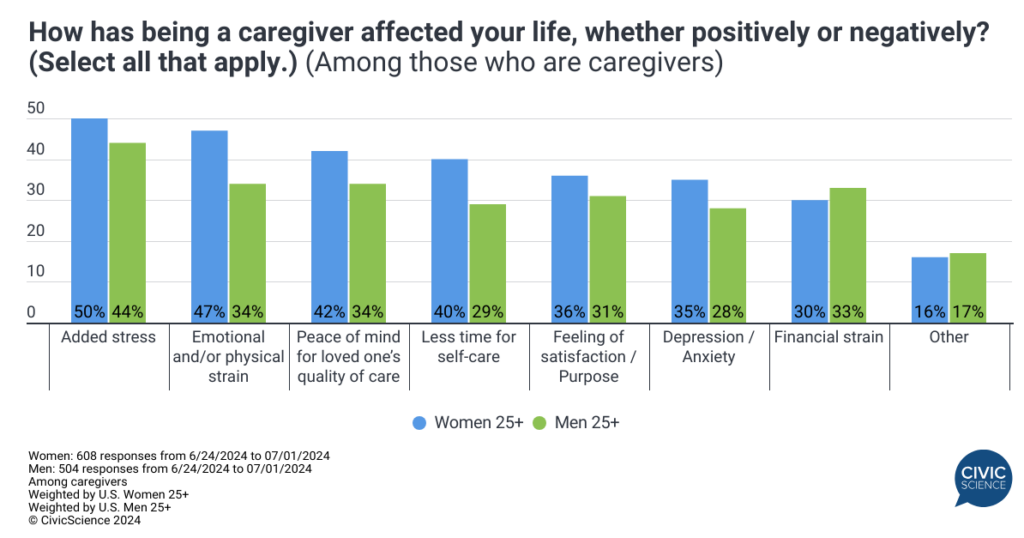This is just a glimpse of the insights available to CivicScience clients. Want to see the full picture? Let’s talk.
Caregiving is on the rise. It’s estimated that in 2020 there were 53 million caregivers, up from 43.5 million in 2015. Now, with 73 million people in the U.S. who will be older than 65 by 2030 comes a significantly increased demand for caregivers.
That makes caregivers a consumer segment to watch, as they face unique challenges and needs that set them apart from the general population. According to the CDC, caregiving is a public health issue. It affects the quality of life of both those receiving and giving care. From assisting with daily living to managing finances and providing transportation, caregivers shoulder many responsibilities – which can escalate as the needs of the recipient evolve.
CivicScience examined this segment of U.S. consumers, focusing in on the impact caregiving has on their lives, plus reactions to President Biden’s recent proposal to better support caregivers. Here are three key insights to know:
More Than 3-in-10 Are Primary Caregivers
CivicScience data show that 31% of Americans aged 25 and older are the primary caregiver for someone with a medical condition who is unable to care for themselves. Although CDC historical data found that women aged 45 and older were more likely than men in that age range to be caregivers, CivicScience polling finds that men and women aged 25+ are equally likely to be primary caregivers (31%).
Men are more likely to care for spouses and partners, as nearly one-third of men (25+) who are primary caregivers report providing care for their spouse or significant other with a disabling medical condition. Women are more likely to be the primary caregivers for their parents and children.

Take Our Poll: How prepared do you feel, if at all, for the challenges of being a caregiver?
The Impacts Are Real, Particularly for Women and Mothers
Whether they are unpaid family members, friends, or paid professionals, caregivers play a crucial role in providing long-term care in people’s homes. However, this often comes at a personal cost. Caregiving can significantly affect an individual’s life, from their relationships and social interactions to their ability to work and their mental well-being.
CivicScience uncovered that although being a caregiver can be a rewarding and positive experience, it also has profound negative impacts on the lives of both men and women caregivers. Women and mothers are especially impacted.
Let’s look at the findings:

- Both men and women feel that being a caregiver adds stress to their lives, with 50% of women feeling stressed about their caregiving responsibilities.
- Women caregivers are significantly more likely to say that caregiving has caused them emotional and/or physical strain, as well as less time for self-care.
- Both men and women feel financial strain from being a caregiver. Overall, 30% of women and 33% of men have stated they encounter financial strain while caring for a loved one.
- But slightly more women than men experience feelings of purpose and satisfaction with their role as a caregiver.
- Overall, the challenges of caregiving may be worth it. Forty-two percent of women feel more peace of mind for a loved one’s quality of care by taking on the role of caregiver, much higher than 34% of men.
What about the impact on a person’s employment? Additional data reveal that 16% of U.S. fathers and 17% of U.S. mothers (aged 25+) have decided to leave, change, or turn down a job in the past 12 months because of their responsibilities toward caring for those with medical issues.
However, moms are much more likely than dads to have experienced a job disruption due to childcare needs in addition to caregiving – 12% of mothers have had to turn down a job, change, or leave their current position because of both caregiving and childcare needs (compared to 4% of fathers).1 CivicScience data has previously shown how evolving childcare issues have impacted women’s employment.
Americans Largely Support Increased Federal Funding for Caregiving
The Biden administration has proposed a plan to ensure better quality care and support for caregivers and care recipients. To do this, the proposal calls for increased federal subsidies for paid family leave, childcare, and home care for the disabled and elderly.
The majority of Americans (73%) support this funding. Given the greater impact of caregiving on women seen in the data, it’s not surprising that 42% of women are ‘very likely’ to support the legislation, compared to 34% of men (aged 25+). Conversely, men (36%) are far more likely to staunchly oppose these subsidies than women (19%).

Let Us Know: How concerned are you about the state of caregiving in the U.S.?
Democrats and Independents are also far more likely to support this increase in federal government subsidies for caregiving than Republicans, although the majority of Republicans are in favor.
As the public’s sentiments on caregiving evolve and more people take on this responsibility, CivicScience insights can help to show how both caregivers and care recipients are being affected, including the impacts on spending and other consumer behaviors.
CivicScience ‘always-on’ 1st-party data tracking makes it easy to identify shifts in consumer behavior before the competition does. See what we can do for your brand.
- 189-236 responses from 06/24/2024-06/29/2024, U.S. adults 25+ ↩︎








